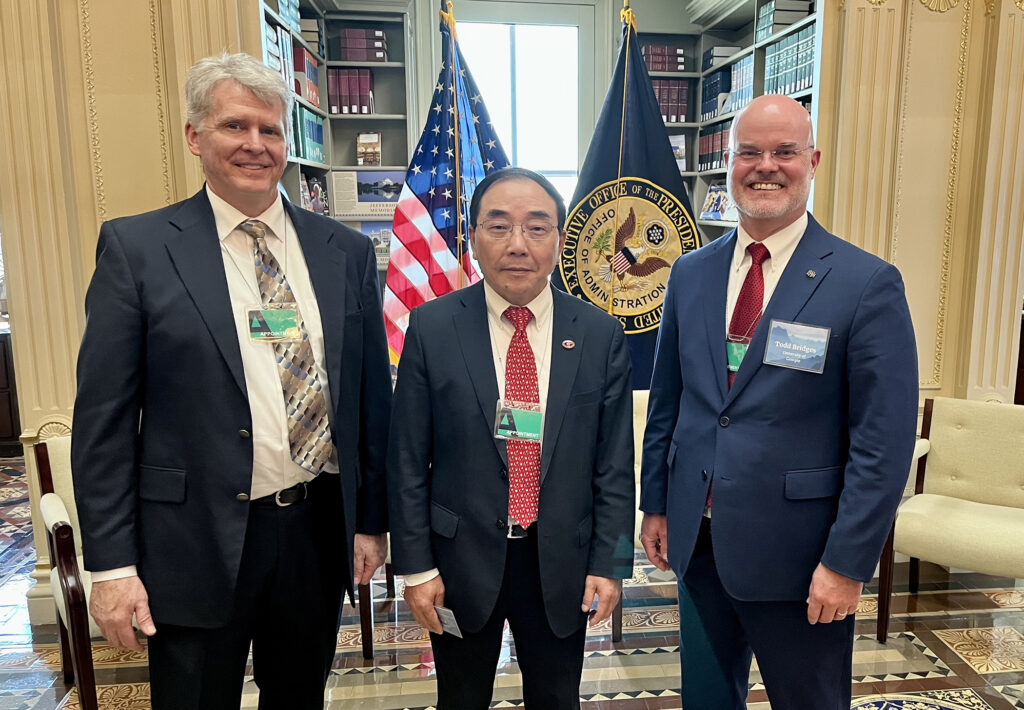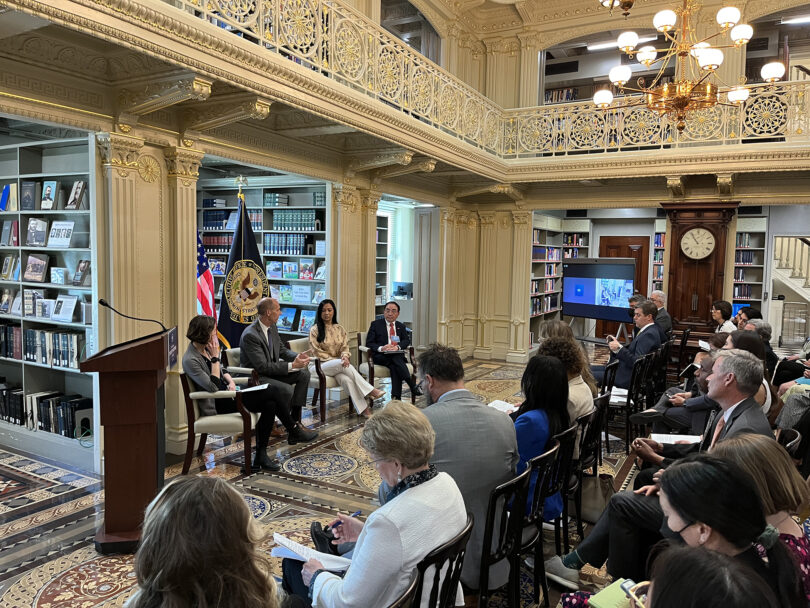During a panel discussion at the White House focused on restoring nature and providing communities tools to be resilient, the University of Georgia’s commitment to teaching, research and public service was highlighted on the national level.
Jack Hu, senior vice president for academic affairs and provost, participated in a panel discussion on workforce development during the Invest in Nature Summit, hosted by the White House Office of Science and Technology Policy. The event on April 20 focused on leveraging nature-based solutions to address the nation’s climate challenges while supporting investments in jobs, youth programs and resilient communities.

Faculty and administrators from the University of Georgia joined representatives from public, private and non-profit organizations from across the country at the White House Invest in Nature Summit on April 20. Picture left to right are Brian Bledsoe, UGA Athletic Association Professor in Resilient Infrastructure; Jack Hu, senior vice president for academic affairs and provost; and Todd Bridges, professor of practice in the UGA College of Engineering and former national lead for the U.S. Army Corps of Engineers’ Engineering with Nature Initiative. (Submitted photo)
“At the University of Georgia, we are definitely seeing a lot of excitement in this area,” Hu said. “We’ve invested in faculty with expertise in nature-based solutions, developed educational programs to support students and address workforce needs, and created a framework to support research and engagement with government agencies, industry and communities.”
Hu was joined at the summit by Brian Bledsoe, Georgia Athletic Association Distinguished Professor in UGA’s College of Engineering, and Todd Bridges, who recently joined UGA as a professor of practice in the College of Engineering, after a long career as the national lead for the U.S. Army Corps of Engineers’ Engineering with Nature Initiative.
In addition to Hu, the panel discussion on workforce development featured Tom Smith, executive director of the American Society of Civil Engineers, and Davida Herzl, CEO of Aclima, a company that uses a network of roving and stationary sensors to provide air pollution and greenhouse gas data to governments, companies and communities.
During the discussion, Hu highlighted UGA’s Institute for Resilient Infrastructure Systems (IRIS), an interdisciplinary group of researchers and staff representing a broad spectrum of disciplines. He noted IRIS has developed educational programs to prepare students for careers in the green economy, is conducting foundational research on nature-based solutions, and is working with stakeholders and partners to address policy barriers.
“Students from different disciplines are also interested in what we are doing,” he said. “They participate in certificate programs and capstone projects, working together with communities in the state.”
Hu touched on several IRIS efforts in this vein, including the creation of natural infrastructure training and internship with partners including Ducks Unlimited, the U.S. Army Corps of Engineers, the Walton Family Foundation and the Network for Engineering With Nature.
For example, IRIS recently established the Natural Infrastructure Fellowship. Funded by Ducks Unlimited, the initiative includes a master’s program designed to give students practice-oriented experience in natural infrastructure methods, engineering, tool development, cost and economic analysis, monitoring and adaptive management, and social dimensions of climate resilient infrastructure.
The IRIS team believes this program and others like it will be instrumental in addressing workforce needs in the nature-based systems sector.
Hu also highlighted UGA initiative in Connected Resilient Communities led by the Archway Partnership in the Office of the Vice President for Public Service and Outreach.
“Nature is an essential ingredient of resilient communities, a fact that was reflected by those who spoke at the White House Invest in Nature Summit,” Bridges said. “It’s also reflected in the purpose and work of IRIS. Building the national workforce capacity to deliver nature-based solutions is at the heart of IRIS.”








